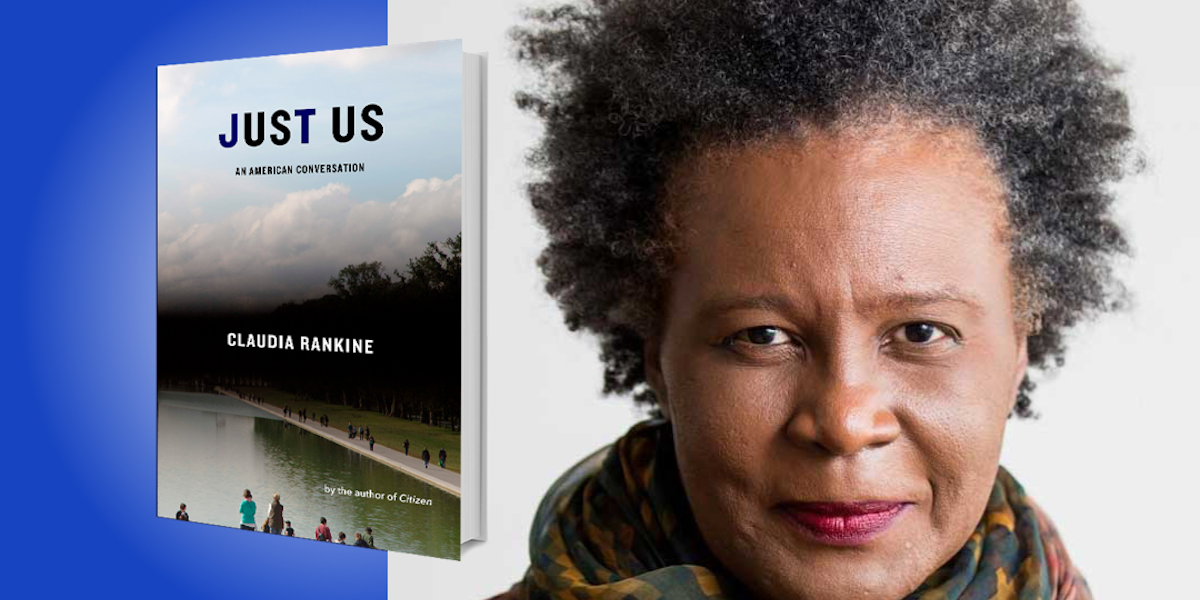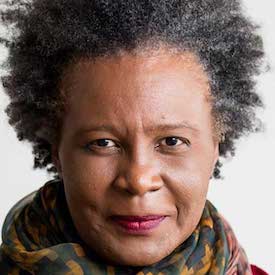Claudia Rankine is a chancellor of the Academy of American Poets, the winner of the 2014 Jackson Poetry Prize, and a contributing editor of Poets & Writers. She is the Frederick Iseman Professor of Poetry at Yale University, and received a MacArthur Fellowship in 2016. Her work has appeared recently in the Guardian, the New York Times Book Review, the New York Times Magazine, and the Washington Post.
Below, Claudia shares 5 key insights from her new book, Just Us: An American Conversation. Download the Next Big Idea App to enjoy more audio “Book Bites,” plus Ideas of the Day, ad-free podcast episodes, and more.
1. Conversations are an opportunity to build something with another person.
They are a kind of creation—something fleeting perhaps, something intimate, something lingering. A conversation is a space made solid between two people. The solidity is invisible, but it holds—we return to it, we refer to it, we turn it over in our mind. When I’m speaking with someone, I think, what are we making?
2. Stories we’re invested in might deserve to be fact-checked, both emotionally and historically.
I once had a conversation with a white guy on a plane. Later on, we reconnected, and he told me, “I misrepresented something I’d said to you about my hometown . . . I believed I was being honest in the moment, but after our talk, it was evident. I told you I didn’t notice much tension between the black kids and the white kids in our town. I guess it’s not that I didn’t know this, so much as I wanted to forget it. Because thinking back, tension was everywhere.” I can only respect a person who has that kind of introspection, who is willing to go back, rethink, and ask, Why did I say that? Was it because it makes me feel more comfortable? Is it really true?
“A conversation is a space made solid between two people.”
3. Feelings can change structures.
This idea is a way of understanding the protests following George Floyd’s murder. George Floyd was killed by a policeman whose knee cut off the circulation in his neck for over eight minutes, and the subsequent protests became a communal emoting of a shared feeling. At a press conference, his face stained with tears, basketball coach Doc Rivers said, “It’s amazing to me why we keep loving this country, and this country does not love us back.” Weeks later, presidential hopeful Joe Biden said, “I think about what it takes for a Black person to love America. That is a deep love for this country that has so far, for too long, never been recognized.” Doc Rivers’ comments brought Joe Biden to that moment, to those thoughts. His feelings provided an insight for the person who will hopefully guide this country back to its democratic principles.
4. We need to talk about the realities of race and racism.
The concept of race is constructed, but that which is imagined can still gain real force in the world. And before we can productively redefine those categories, we have to reckon with both our present-day realities and their historical roots. Conversations around race, racial difference, and anti-blackness—especially in a society founded on white supremacy—are always difficult. And while the term “white supremacy” might seem extreme, consider, for example, Thomas Jefferson’s Notes on the State of Virginia. Even Abraham Lincoln based his plea to end slavery on a belief in white supremacy.
5. True friendships can withstand tough conversations.
Many of the conversations documented in Just Us are with my close friends, people of many races and genders. So the book contains not only my thoughts and views, but those of others, as well as different interpretations of the specific conversations we’ve had. These trusting friendships are able to hold moments of disagreement, even when it comes to matters of race and racism. My friendships are based on a true recognition of who I am and who my friend is, so they grow and evolve because of our difficult discussions.
For more Book Bites, download the Next Big Idea App today:
































